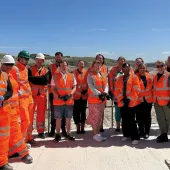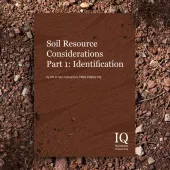Passing on the Passion
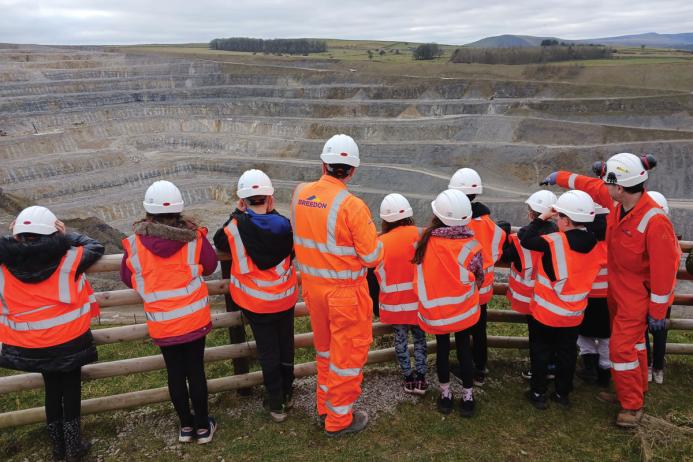
First published in the July 2023 issue of Quarry Management
Three Minerals Matter STEM Ambassadors explain what motivates them to address young people
Research conducted in May 2023 by engineering and professional services firm WSP found that the majority (73%) of current UK students feel uninformed about the green jobs available to them[1].
In the UK Government’s policy paper, ‘Critical Minerals Refresh: Delivering Resilience in a Changing Global Environment’[2], is an acknowledgment of the need for skills and education to form part of the UK’s resilience in critical minerals, citing Cambourne School of Mines’ degree in Mining Engineering and Mine Management degree apprenticeship.
Both are significant because we know many young people are part of the most acutely climate-conscious generations (including millennials and Gen Z), concerned as to what their futures will be. With the prospect of a climate-poor inheritance, many want to be pioneers and changemakers, eager to engage with like-minded employers. They value industries and businesses that are thinking about what can be done.
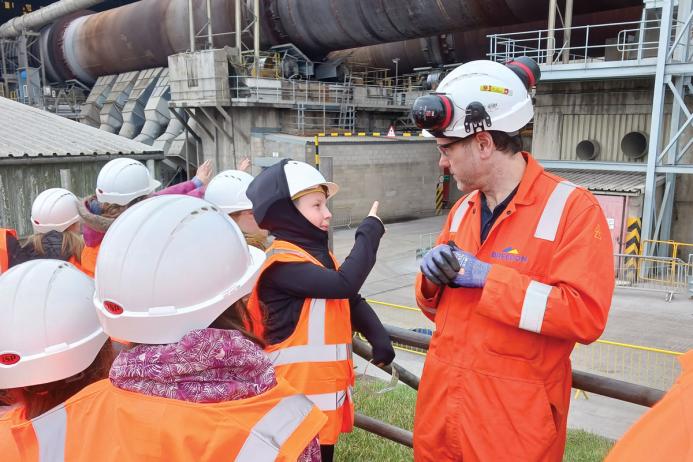
The mineral products sector is well placed, with good stories to tell on heading towards net zero, and making real-time interventions that are meaningful for sustainability and biodiversity targets. A good match for career aspirations, so long as the word gets out.
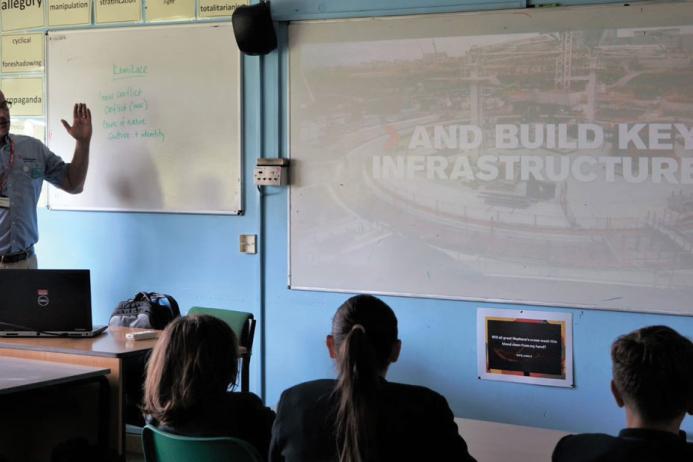
Who is stepping up?
So, who is going to tell them? Who is going to harness the energy of youth to the betterment and resolution of the skills shortages in our sector? Who are the representatives of our sector with the passion and desire to dispel myths, educate the future workforce about the extensive and engaging work that the sector does, both as the foundation of the economy and the cornerstone of climate care?
One motivated group of volunteers taking up the challenge and hoping that more will do so too, are STEM Ambassadors, and in particular Minerals Matter STEM Ambassadors – those with the knowledge and passion to educate young people about the mineral products sector.
Minerals Matter, a cross-industry response to engaging the next generation, canvassed the experiences of three of them, interviewing Justin Collis FIQ, project and engineering manager, Hanson Aggregates UK Ltd; David Sandbrook, partner, head of minerals and waste management, Carter Jonas; and Graham Hole, associate, HR business services, Sibelco.
Each gave their thoughts on what being a STEM Ambassador means to them and how they feel they add value, and why addressing the skills shortages matters by making invaluable connections with those to whom the world of work is a mystery and just a looming thought on their horizons – passionate young people who are looking for guidance.
An urgent need
‘We must understand that we must invest time now to invest in our future. As an industry our demographic historically was the 52-year-old white male. We know that a diverse workforce makes us a stronger business by harnessing a wider range of views. Engagement with young people can only strengthen our business,’ says Justin.
‘You can’t be what you can’t see. Key to that is succession. So, it’s important that we have a pipeline of people. The next generation promise to improve diversity and bring in new and innovative ideas, being naturals at embracing technology,’ says David.
‘From the minerals surveying profession, acknowledged as critical to our sector, the next generation is very much on our agenda. I am lucky to lead a diverse team whose focus is less about filling holes and more about energy management and waste. Currently, we look for geologists, earth scientists and geographers who identify with these environmental management issues,’ adds David.
Repetition and reinforcement from primary onwards
Research has also demonstrated that engagement should not be a one-off experience. Repeated careers interventions and advice is key to being productive against one-off interventions, especially for young people from disadvantaged backgrounds.[3]
‘From my experience of visiting several schools in our local area is there is no real understanding of the mineral products sector in our area. That is why support for schools, and regular school visits are crucial to driving that understanding. The Minerals Matter message is one that is integral to driving that understanding,’ says Graham.
‘Repeated investment for effective results. If we share the knowledge today then we will reap the benefits tomorrow,’ he added.
Early and repeated intervention with primary schools can help to dispel sector stereotypes and demonstrate a diverse workforce.[4] Such positive primary school interactions can be very memorable and reflect on subject choices taken in secondary schools for many students.
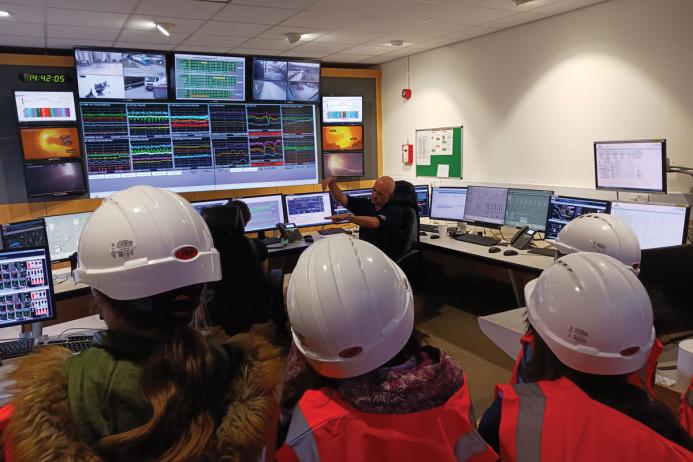
Just share your story
No doubt the prospect of presenting a STEM subject or activity to a group of young people can be daunting and challenging for even the most experienced of people in our sector, but it is the way to make a critical difference that motivates STEM Ambassadors.
‘I have a passion to pass on skills for life. The work we do might be that memorable moment for someone who might be the next operations manager or chief executive officer. Seeing young people grow and expand on their knowledge and skill set. Seeing that Special Educational Needs and Disabilities (SEND) are not barriers and are embraced, as we all have a role in society,’ asserts Justin.
For David, he sees it as an opportunity for him to learn too. ‘I welcome the reverse mentoring, being able to step away from your desk and hear what people have to say and what’s important to them. I do it as a role model and encourage my younger team members to do it. We need to let students know there are wider opportunities than doctor, accountant, lawyer routes. They are environmentally motivated; climate change is important and it’s heart-warming to see.’
Justin, too, refers to the personal development that being a STEM Ambassador delivers. ‘Take a leap of faith as the initial thought is the first step. Tools and resources can be provided and go with another ambassador to ease your own potential anxiety. I would wager once you start to share your own experiences you will find that comfort zone and excel. We are in this together and can assist each other in developing our future industries.’
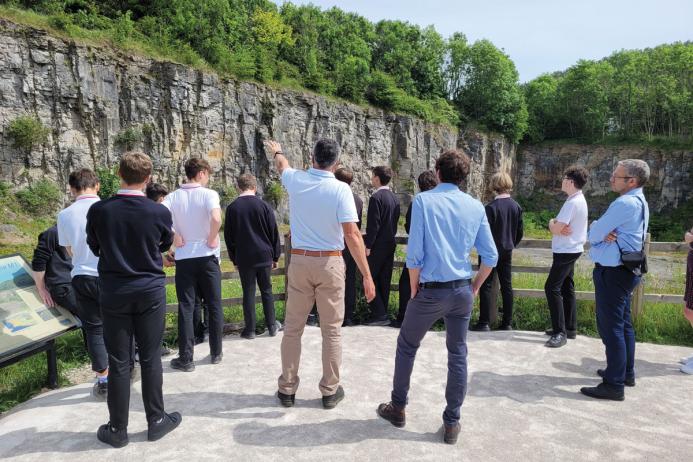
University no longer a universal choice
There is also opportunity and clear water for a strong case to be made for learning while earning and the sector has pathways to achieve that.
David is increasingly hearing from students he engages with that ‘Money plays a factor and that automatically going to university isn’t a given anymore. The costs are too high and the debt too long. Students understand that they can develop a skill and a career without being lumbered with debt by enrolling as apprentices within industry employers. I say let them earn, buy a house, a car and spend in the economy.’
Justin, too, feels the door is open to engage students into industry to pursue careers and academia via the working routes, rather than university alone. ‘With 2026 expecting to see 1,000,000 students enrol at university for just 650,000 places, we know one-third could be our next apprentices. They will earn while they learn and integrate into our business whilst being educated to degree level. Those that want to stay local can, and with the skills harnessed they can travel the world should they wish, without a £50,000 student loan chasing them.’
Soft skills as well as technical
In a blog on the HEPI site, ‘Essential Skills for 2035’, education commentator Mary Curnock Cook CBE, highlighted the continuing importance of so-called soft skills.[5] She pointed to recent research from the NFER, Pearson, and others – all suggesting a growing demand by employers for skills such as communication, information literacy, and problem-solving.
Graham Hole concurs: ‘There is no specialism that we specifically talk about, as young people are not aware of the vast range of opportunities available in the mineral products sector. Our discussions with young people are always kept broad to showcase the full range of what they could do.’
For Justin, being a STEM Ambassador facilitates the use of ‘a whole variety of resources, depending on age and activity, so it’s appropriate. It could range from a simple debate on a quarry extension, which shows employability skills such as listening, speaking, problem-solving, creativity, staying positive, aiming high, leadership and teamwork, through to programming and flying a drone.’
Leadership responsibilities
Those who wish to volunteer for STEM roles need the freedom to do it says David. ‘Senior leaders can be seen to be role models. Not only standing up and doing their bit, but also standing aside for younger members of their teams to educate and take part in events. Lasting mental images are important – if young people can see people operating it develops the desire. Get them out on site. They will make the link between the circular economy and responsible resourcing and start to understand that biodiversity and good environmental management is commonplace in the sector.’
Justin adds: ‘Many companies, such as Hanson, offer a volunteering day and a STEM Day would be a great use of it. The time invested will be returned to us and may only be an hour out of your day. With my knowledge base I do not need to prepare extensively for each session and can just deliver to the relevant audience level.’
The many, not the few
So, what is to be done? Getting more STEM Ambassador volunteers for one. Minerals Matter currently has 25 of its own STEM Ambassadors enrolled with STEM Learning. Justin, alone, has, this year, completed 73h, reaching six different locations and 2,000 students.
Imagine if one person from every company could just complete a fraction of that; one hour per week, per month, per year, what impact that would have on spreading awareness and inspiration to young people.
It is why Minerals Matter is working with STEM Learning to create a team of Minerals Matter STEM Ambassadors to focus STEM knowledge and activities on their relevance to our sector. Those starting their careers are just as important as those with 40 years of experience. Going back to their schools to showcase their successes, explain their opportunities, is very powerful. It cuts through to young people, perhaps overwhelmed by careers advice.[6]
The sector is also seeing more and more strong and diverse voices on social media, many successful people who are working in the sector, demonstrating their daily activities, and creating content via their preferred social platforms and mediums, especially video. These influencers demonstrate an appetite to celebrate the work being done and will play a part in influencing peer groups into finding out more about the career opportunities.
Emily Noble, future skills manager at Minerals Matter, concludes: ‘Becoming a Minerals Matter STEM Ambassador can be your way, to coin a JFK phrase, to ‘ask not what your country can do for you, but what you can do for your country’. Helping young people to shape their world by showing how the mineral products industry has shaped yours is the collective responsibility of us all.’
Minerals Matter is here to help the industry meet its challenges around skills and career pathways by actively reaching out and engaging the next generation. For companies and individuals wanting to get involved and support Minerals Matter, there is more information and resources, including how to register as a Minerals Matter STEM Ambassador, at: https://minerals-matter.co.uk/get-involved.
REFERENCES
Effective Careers Interventions for Disadvantaged Young People, A Report by the Behavioural Insights Team (November 2021), Authors: Jessica Hunt, Kathryn Atherton, Eleanor Collerton and Nancy Wilkinson. The Careers and Education Company, p19.
Effective Careers Interventions for Disadvantaged Young People, A Report by the Behavioural Insights Team (November 2021), Authors: Jessica Hunt, Kathryn Atherton, Eleanor Collerton and Nancy Wilkinson. The Careers and Education Company, p21.
https://www.hepi.ac.uk/2023/06/13/essential-skills-for-2035/
Effective Careers Interventions for Disadvantaged Young People, A Report by the Behavioural Insights Team (November 2021), Authors: Jessica Hunt, Kathryn Atherton, Eleanor Collerton and Nancy Wilkinson. The Careers and Education Company, p25.
Subscribe to Quarry Management, the monthly journal for the mineral products industry, to read articles before they appear on Agg-Net.com




